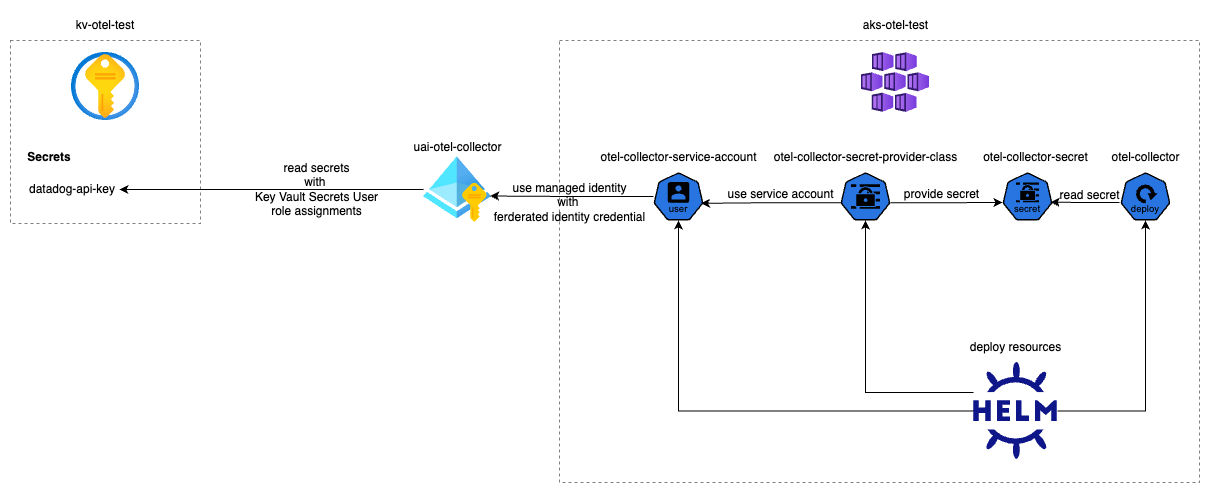
I recently deployed a OTEL collector in a AKS to collector metrics, logs and traces. As the OTEL collector forwards these data to other systems, we need credentials to connect to these systems.
I used the Secrets Store CSI Driver to read secrets from a Azure Key Vault.
Define local values
This block defines all necessary local values to avoid repetition and improve maintainability. It includes names and IDs for Azure resources like the Key Vault, identity settings, and parameters for the OpenTelemetry (OTEL) Collector deployment. Using locals makes the code cleaner and easier to manage.
locals {
resource_group_name = "rg-otel-test"
location = "germanywestcentral"
tenant_id = "xyz"
subscription_id = "xyz"
key_vault_name = "kv-otel-test"
key_vault_id = "xyz" use output of key vault object
otel_collector = {
namespace = "monitoring"
service_account_name = "otel-collector-service-account"
secret_name = "otel-collector-secret"
secret_provider_class_name = "otel-collector-secret-provider-class"
image_tag = "0.128.0"
}
cluster_oidc_issuer_url = "xyz" # use output of aks object
federated_identity_credential_audience = ["api://AzureADTokenExchange"]
}
Configure AKS and Key Vault
Enabling workload_identity_enabled and oidc_issuer_enabled on the AKS cluster lets your Collector pods authenticate to Azure AD via federated identity, eliminating the need for long‐lived service principal credentials. The key_vault_secrets_provider block turns on automatic secret refresh (every 10 s) so your pods always see the latest Key Vault values. Finally, setting enable_rbac_authorization = true on the Key Vault lets you enforce Azure RBAC policies for secure, workload‐identity–based access.
resource "azurerm_kubernetes_cluster" "this" {
...
workload_identity_enabled = true
oidc_issuer_enabled = true
key_vault_secrets_provider {
secret_rotation_enabled = true
secret_rotation_interval = "10s"
}
...
}
resource "azurerm_key_vault" "this" {
...
enable_rbac_authorization = true
tenant_id = local.tenant_id
...
}
Identity
We create a User-Assigned Managed Identity to authenticate the OTEL Collector in Kubernetes with Azure. We assign it the Key Vault Secrets User role on specific secrets, then bind it to a Kubernetes service account via a federated identity credential for workload identity (OIDC) federation.
resource "azurerm_user_assigned_identity" "this" {
name = "uai-otel-collector"
resource_group_name = local.resource_group_name
location = local.location
}
resource "azurerm_role_assignment" "uai_secret_user_datadog_api_key" {
principal_id = azurerm_user_assigned_identity.this.principal_id
scope = "${local.key_vault_id}/secrets/datadog-api-key"
role_definition_name = "Key Vault Secrets User"
}
resource "azurerm_federated_identity_credential" "this" {
name = "fic-otel-collector"
resource_group_name = local.resource_group_name
issuer = local.cluster_oidc_issuer_url
audience = local.federated_identity_credential_audience
parent_id = azurerm_user_assigned_identity.this.id
subject = "system:serviceaccount:${local.otel_collector.namespace}:${local.otel_collector.service_account_name}"
}
Secret Provider Class
This creates a SecretProviderClass that instructs Kubernetes’s CSI driver how to mount secrets from Azure Key Vault into OTEL Collector pods. It references the managed identity, vault name, and the specific secret objects to expose at runtime.
resource "kubernetes_manifest" "secret_provider_class" {
manifest = {
apiVersion = "secrets-store.csi.x-k8s.io/v1"
kind = "SecretProviderClass"
metadata = {
name = local.otel_collector.secret_provider_class_name
namespace = local.otel_collector.namespace
}
spec = {
provider = "azure"
parameters = {
usePodIdentity = "false"
clientID = azurerm_user_assigned_identity.this.client_id
tenantId = local.tenant_id
keyvaultName = local.key_vault_name
objects = <<-EOT
array:
- |
objectName: datadog-api-key
objectType: secret
objectVersion: ""
EOT
}
secretObjects = [
{
secretName = local.otel_collector.secret_name
type = "Opaque"
data = [
{ key = "DATADOG_API_KEY", objectName = "datadog-api-key" }
]
}
]
}
}
depends_on = [
azurerm_role_assignment.uai_secret_user_datadog_api_key,
azurerm_federated_identity_credential.this
]
}
Deploy OTEL Collector with Secrets
We deploy the OTEL Collector via Helm, enabling workload identity and mounting the CSI volume for secrets. Secrets are exposed in the pod at /mnt/secrets-store and injected as environment variables using extraEnvsFrom.
resource "helm_release" "this" {
name = "helm-release-otel-collector"
repository = "https://open-telemetry.github.io/opentelemetry-helm-charts"
chart = "opentelemetry-collector"
namespace = local.otel_collector.namespace
cleanup_on_fail = true
set = [{
name = "serviceAccount.annotations.azure\\.workload\\.identity/client-id"
value = azurerm_user_assigned_identity.this.client_id
}, {
name = "podLabels.azure\\.workload\\.identity/use"
type = "string"
value = "true"
}, {
name = "extraVolumes[0].name"
value = "secrets-store"
}, {
name = "extraVolumes[0].csi.driver"
value = "secrets-store.csi.k8s.io"
}, {
name = "extraVolumes[0].csi.readOnly"
value = true
}, {
name = "extraVolumes[0].csi.volumeAttributes.secretProviderClass"
value = local.otel_collector.secret_provider_class_name
}, {
name = "extraVolumeMounts[0].name"
value = "secrets-store"
}, {
name = "extraVolumeMounts[0].mountPath"
value = "/mnt/secrets-store"
}, {
name = "extraVolumeMounts[0].readOnly"
value = true
}, {
name = "extraEnvsFrom[0].secretRef.name"
value = local.otel_collector.secret_name
}, {
name = "extraEnvsFrom[0].secretRef.optional"
value = false
},{
name = "image.repository"
value = "otel/opentelemetry-collector-contrib"
},{
name = "image.tag"
value = local.otel_collector.image_tag
},{
name = "mode"
value = "daemonset" # modify as needed
},{
name = "serviceAccount.name"
value = local.otel_collector.service_account_name
}]
depends_on = [
kubernetes_manifest.secret_provider_class
]
}
Configure OTEL Collector
After all infrastructure is provisioned, we configure the OTEL Collector to use the secrets (e.g., Datadog API key) via environment variables. These values are securely mounted into the pod from Azure Key Vault using the SecretProviderClass and CSI driver. This ensures sensitive credentials are not hardcoded in the configuration.
connectors:
datadog/connector: null
exporters:
datadog/exporter:
api:
fail_on_invalid_key: true
key: $${env:DATADOG_API_KEY}
site: datadoghq.eu
Optional: Dynamic Reload with Reloader
This annotation hooks into Stakater Reloader so that whenever the Kubernetes Secret (populated from Azure Key Vault via the CSI driver) is updated - such as when you rotate keys in Key Vault - the Collector pod automatically restarts and picks up the new values. Without this, you’d need to manually roll or restart pods after every secret rotation in Azure Key Vault to ensure the OTEL Collector uses the latest credentials.
Prerequisite: You must have the Reloader Helm chart deployed in your cluster and your Azure Key Vault secrets already mounted into Kubernetes via the Secrets Store CSI Driver.
resource "helm_release" "this" {
...
name = "annotations.secret\\.reloader\\.stakater\\.com/reload"
value = local.otel_collector.secret_name
...
}